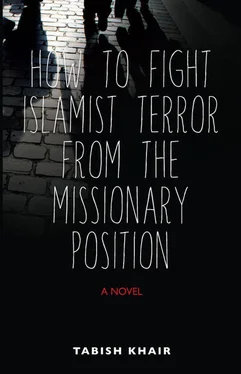Tired of asking and looking around in a place that seemed without end to him, Ravi gravitated back towards the section near the entrance, the exit. He stood next to a table lined with national newspapers, with editorials worrying about the state of the world and making polite noises of criticism about the treatment of refugees in the country, and tabloids full of lurid scandals and crimes, the latter often pointing a vague finger of accusation at immigrants. He did not necessarily disagree with all the newspapers and they did not always agree with each other, but Ravi found their assurance, whether it was about Nigeria or Denmark or USA, difficult to stomach. It was this commonality of tone that made all the news sound like a repeat of what Ravi had read for weeks, months, years. But just as he could not walk away from the restaurant—it would have been rude of him, surely—he could not resist reading such headlines day after day. They were in different ways (mostly well-meaning, mostly nice) so oblivious of him, and yet he had to keep looking at them, for them, these printed words he knew by heart even before they were printed each night.
He stood there browsing through the newspapers for five minutes or so. It was then that he noticed a corridor leading to a quiet and empty section.
The corridor had surprisingly cheap wooden paneling. The section it led to was empty, and unlike the rest of the restaurant, it had chairs piled up on the tables. The chairs and tables were of the spindly kind used in cafés. This section was probably used during earlier hours to serve customers who wanted a coffee and cake rather than a meal. Ravi walked into it listlessly, noticing the chairs and round wooden tables, the empty beer counter, the pattern on the floor.
He was looking at the floor when he almost bumped into someone. It was a waiter, not a local this time, but someone from the Middle East or Turkey. Can I help you, sir? the man said in English. A surprising feeling of gratitude flooded Ravi. He noticed that the man did not wear the uniform of waiters. He was probably a cleaner from the kitchens below, sent up to fetch the tray of dirtied utensils that he was carrying. Ravi explained his search to the man.
Have you looked in the reserved sections? asked the man. Seeing the look of incomprehension on Ravi’s face, the man pointed to the cheap wooden paneling along one side of the corridor: there are rooms behind those panels. They are usually used by special guests. Your family might have been placed there.
Ravi slid one of the panels open, and was met with garish light. The room inside contrasted with the main hall of the restaurant through which he had been walking until now. The main hall was dimly lit; the guests were dressed in conservative greys, blue and black, the tables arranged at a polite distance from each other all over the floor. Pearls and silver hung from the ears or around their necks and sometimes glinted decorously in the candlelight. But this hidden room was like a wedding shamiana in a small town in India or Pakistan. It was garishly lit: the men talking confidently, the women speaking in low tones or keeping quiet. Some of them wore gold. There was a buffet table in the middle of the room, piled with dishes, and the chairs were ranged along the four walls.
This section was more disorderly than the other parts of the restaurant, but it was an abashed sort of disorder: as if a housewife had received unannounced guests and had done what she could to tidy up in a jiffy. As if order was the state that was being aimed at, and the bits and pieces, the napkin or crawling child on the floor, were inherently a failure.
Ravi realized with a shock that almost all the people sitting in the room, the women dressed in gorgeous colors, were South Asians: Indian, Pakistani, Bangladeshi, Sri Lankan. The women mostly sat on the chairs along the walls, holding plates of food in their hands or laps, sometimes feeding a child. The men, more conservatively dressed, stood conversing desultorily in groups all over this secret room in the paneling. They were attired like aspiring businessmen or government functionaries on a rare trip abroad. Some of the groups were mixed, but mostly the men stood together.
A thickset middle-aged man spotted Ravi and sauntered over to him. “You live here?” the man asked in a heavy Haryanvi or Punjabi accent. Ravi nodded in affirmation. The man’s slightly florid features lit up with a smile and a smirk of recognition: South Asian to South Asian, Indian to Indian, man to man. So, where are the fun spots of this famous city? he asked again, with a wink. You know, he repeated, the fun places.
It took Ravi more than a couple of seconds to understand the question. Slowly the words sank in, reinforced by the sly look in the man’s eyes. It was not really a leer. Ravi stared at him for another second. Then he did something incredibly rude: he turned on his heels and started to walk towards the exit.
NOVEMBER, NOVEMBER, NOVEMBER
The uncertain summer, rain-riven one week and sun-drenched the other, had hiccupped into a fluctuating warm and cold autumn that year. This was a relief, as there were autumn days when the annual darkness was held at bay. November really started in December, at least for Ravi. But it lasted, as Ravi’s favorite Danish poet had prophesied, much beyond December.
I have looked at some of what I have written until now and I am surprised by the fact that it is my relationship with Ms. Marx that comes across as passionate, in an immediate sexual sense, while Ravi’s glass-brimming affair with Lena, if one were to disbelieve Ravi’s words, might strike you as restrained and cold. Perhaps that is so because I cannot really say much about Lena and Ravi. It is true that when Ravi spoke of his feelings, which was not as often as you might assume, or when—and this was quite often—he spoke of Lena, I had no doubt that his metaphor of the full glass was valid. Occasionally, when I saw them together, I would feel convinced too, but not always. There were moments when I resented Lena on Ravi’s behalf—because he seemed so incapable of resenting her—and wondered whether she shared the passion that Ravi felt. Or was she simply flattered by the flamboyance of his love for her? Ms. Marx had planted the germ of a doubt in my mind. Sometimes I felt that whatever Ravi saw in her was just a reflection of his own fire, and what Lena was capable of was not passion but niceness.
Ravi must have had his doubts too, as his dream-story suggested to me. But his faith in Lena’s love was never shaken. Looking back, I see this as something he had in common with Karim Bhai. Perhaps that is why they took to each other across such obvious differences of background, character and habit. There is obviously a very thin line dividing faithfulness from fanaticism—and I wonder if, in a world of easily exchangeable commodities, we can even see that line anymore. I know I could not in the case of Karim Bhai. Perhaps Ravi could. Perhaps Ravi thought he could. Perhaps that is why he never grew suspicious of Karim, on his own, not until I talked to him.
But there might have been something misleading about the way I narrated my relationship with Ms. Marx too; particularly, I fear, the kitchen scene. There are too many Hollywood films in which you see pans flying and plates smashed as the hero and the heroine bounce from one kitchen wall to another and finally end up enmeshed on the floor. I would be misleading you, reader, if I implied that this was the standard procedure between Ms. Marx and me.
Remember, Ms. Marx had a seven-year-old son. Even if we had been the sort that wished to bounce from kitchen shelf to kitchen floor, oblivious of either the danger from knives and jagged pieces or the expense of broken china, the presence of a young boy in the house would have precluded that option.
Читать дальше












